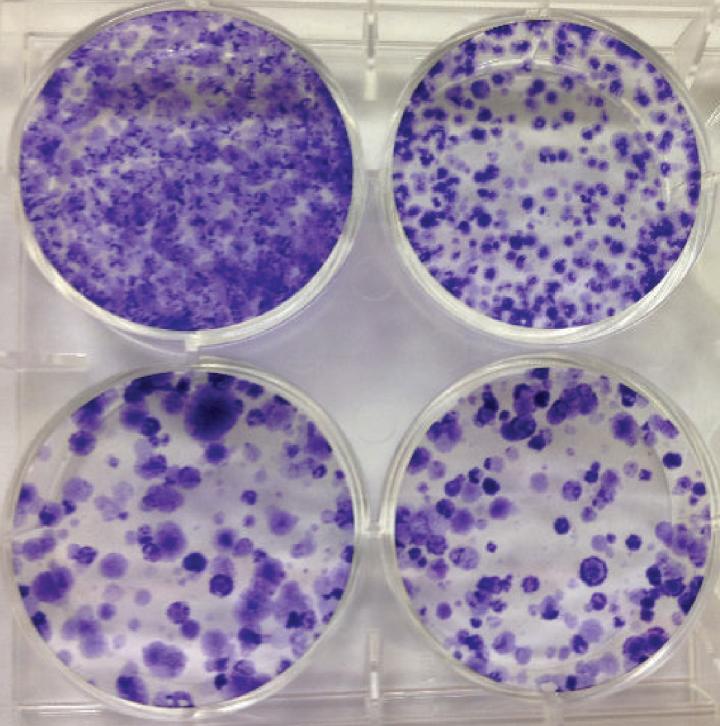

Compared with a control (top left), removal of βcatenin (top right) or Importin-11 (bottom left and bottom right) reduces the growth of colorectal cancer cells carrying a mutation in APC.
Credit: Mis et al., 2019
Usage Restrictions: Reporters may freely use these materials in news coverage with the appropriate credit information.
Around 80% of colorectal cancers are associated with mutations in a gene called APC that result in elevated levels of the βcatenin protein. This increase in βcatenin is followed by the protein's accumulation in the cell nucleus, where it can activate numerous genes that drive cell proliferation and promote the growth and maintenance of colorectal tumors.
But how βcatenin enters the cell nucleus after its levels rise is poorly understood. “Because the molecular mechanisms underlying βcatenin nuclear transport remain unclear, we set out to identify genes required for continuous βcatenin activity in colorectal cancer cells harboring APC mutations,” says Stephane Angers, a professor in the Department of Pharmaceutical Sciences at the University of Toronto's Leslie Dan Faculty of Pharmacy.
Using CRISPR DNA editing technology, Angers and colleagues, including graduate student Monika Mis, developed a new technique that allowed them to screen the human genome for genes that support βcatenin's activity in colorectal cancer cells after its levels have been elevated by mutations in APC. One of the main genes they identified was IPO11, which encodes a protein called Importin-11 that is known to be involved in nuclear import.
Angers and colleagues found that Importin-11 binds to βcatenin and escorts it into the nucleus of colorectal cancer cells with mutations in APC. Removing Importin-11 from these cells prevented βcatenin from entering the nucleus and activating its target genes.
The researchers discovered that Importin-11 levels are often elevated in human colorectal cancers. Moreover, removing Importin-11 inhibited the growth of tumors formed by APC mutant cancer cells isolated from patients.
“We conclude that Importin-11 is required for the growth of colorectal cancer cells,” Angers says. Learning more about how Importin-11 transports βcatenin into the nucleus may help researchers develop new therapies that block this process and reduce the growth of colorectal cancers caused by mutations in APC.
###
Mis et al., 2019. J. Cell Biol. https:/
About the Journal of Cell Biology
The Journal of Cell Biology (JCB) features peer-reviewed research on all aspects of cellular structure and function. All editorial decisions are made by research-active scientists in conjunction with in-house scientific editors. JCB makes all of its content free online no later than six months after publication. Established in 1955, JCB is published by the Rockefeller University Press. For more information, visit jcb.org.
Visit our http://rupress.
Follow JCB on Twitter at @JCellBiol and @RockUPress.












